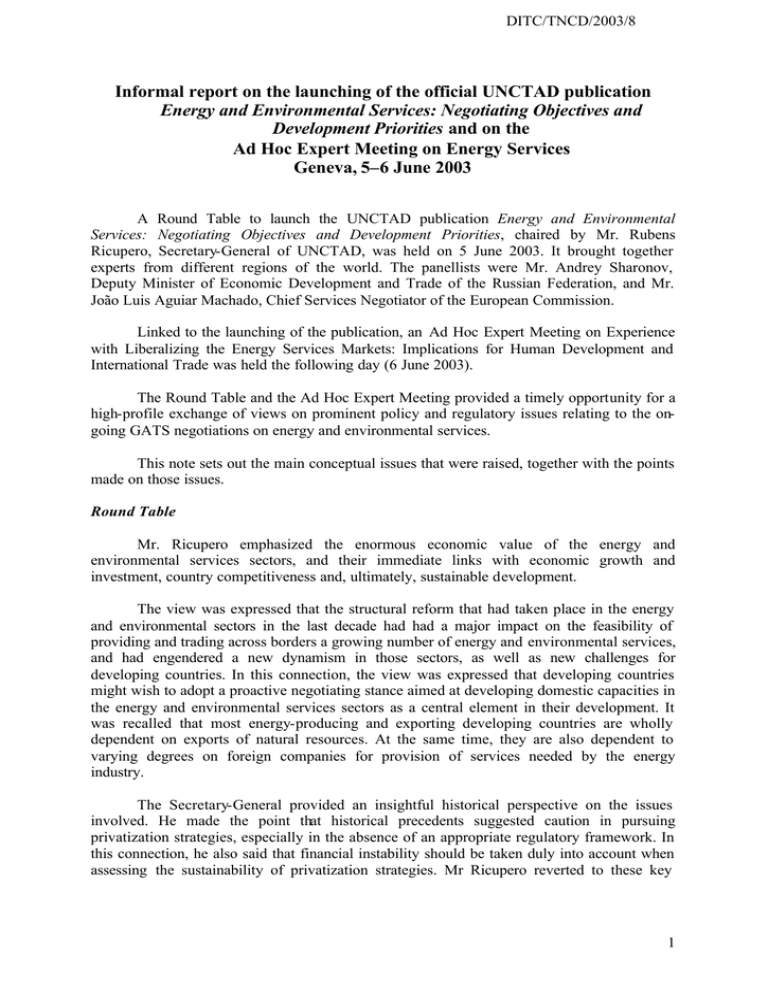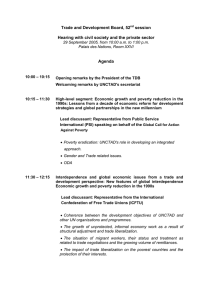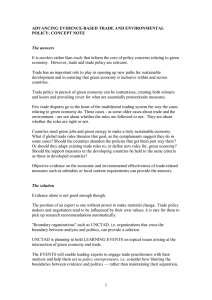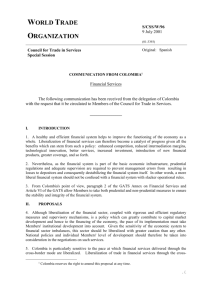Informal report on the launching of the official UNCTAD publication
advertisement

DITC/TNCD/2003/8 Informal report on the launching of the official UNCTAD publication Energy and Environmental Services: Negotiating Objectives and Development Priorities and on the Ad Hoc Expert Meeting on Energy Services Geneva, 5–6 June 2003 A Round Table to launch the UNCTAD publication Energy and Environmental Services: Negotiating Objectives and Development Priorities, chaired by Mr. Rubens Ricupero, Secretary-General of UNCTAD, was held on 5 June 2003. It brought together experts from different regions of the world. The panellists were Mr. Andrey Sharonov, Deputy Minister of Economic Development and Trade of the Russian Federation, and Mr. João Luis Aguiar Machado, Chief Services Negotiator of the European Commission. Linked to the launching of the publication, an Ad Hoc Expert Meeting on Experience with Liberalizing the Energy Services Markets: Implications for Human Development and International Trade was held the following day (6 June 2003). The Round Table and the Ad Hoc Expert Meeting provided a timely opportunity for a high-profile exchange of views on prominent policy and regulatory issues relating to the ongoing GATS negotiations on energy and environmental services. This note sets out the main conceptual issues that were raised, together with the points made on those issues. Round Table Mr. Ricupero emphasized the enormous economic value of the energy and environmental services sectors, and their immediate links with economic growth and investment, country competitiveness and, ultimately, sustainable development. The view was expressed that the structural reform that had taken place in the energy and environmental sectors in the last decade had had a major impact on the feasibility of providing and trading across borders a growing number of energy and environmental services, and had engendered a new dynamism in those sectors, as well as new challenges for developing countries. In this connection, the view was expressed that developing countries might wish to adopt a proactive negotiating stance aimed at developing domestic capacities in the energy and environmental services sectors as a central element in their development. It was recalled that most energy-producing and exporting developing countries are wholly dependent on exports of natural resources. At the same time, they are also dependent to varying degrees on foreign companies for provision of services needed by the energy industry. The Secretary-General provided an insightful historical perspective on the issues involved. He made the point that historical precedents suggested caution in pursuing privatization strategies, especially in the absence of an appropriate regulatory framework. In this connection, he also said that financial instability should be taken duly into account when assessing the sustainability of privatization strategies. Mr Ricupero reverted to these key 1 issues at the conclusion of the Round Table and at the opening session of the Ad Hoc Expert Meeting. Mr. Andrey Sharonov, Deputy Minister of Economic Development and Trade of the Russian Federation, provided an informative description of the regulatory reform that the Russian Federation had undertaken in the energy industry. Attention was drawn to the sensitivity of energy-related issues for both energyexporting and importing countries, and to the multidimensional aspects of liberalization in the energy services sector. Demonopolization and unbundling on the one hand and prices liberalization on the other hand were identified as the key "ideas" structuring the privatization process. Among the relevant issues addressed were the different timing for prices liberalization in the wholesale and retail electricity markets, and the dynamics leading to horizontal mergers in the electricity sector. Important observations were made in connection with liberalization of the gas sector. The view was expressed that the effectiveness of wholesale and retail gas prices liberalization was very much conditional upon upstream demonopolization. The point was also made that, given the significant governmental revenues derived from the incumbent gas monopolist, liberalization in the gas sector had proved highly sensitive. Progressive inflation in retail gas prices was expected to exert a beneficial impact on consumers' behaviour by prompting a shift in favour of energy saving. Mr. João Luis Aguiar Machado, Chief Services Negotiator of the European Commission, highlighted the different economic rationales that underlined the energy and environmental services sectors and certain similarities between those two sectors, notably their relevance to ultimate consumers. The view was expressed that structural reform in the energy sector prompted operational efficiency and significant gains for consumers (lower prices, better quality and a broader range of services). There was a need to accommodate, within the context of structural reform programmes and multilateral trade negotiations, concerns relating to competing policy objectives (e.g. ensuring security of supply and public services obligations). On the issue of water, the panellist stressed the need for an appropriate regulatory framework and the importance of involving all major stakeholders. Both panellists congratulated the UNCTAD secretariat on its new publication, which they regarded as comprehensive and very solid from a technical point of view, and said that it represented a tool from which all UNCTAD member States could benefit. They highlighted the significant role played by UNCTAD in providing insights into, and analysis of, the major negotiating issues relating to energy and environmental services, and the importance for all countries that UNCTAD continue to analyse those issues. During the discussion, it was noted that a limited number of WTO Members had tabled negotiating proposals on energy services during the first phase of the GATS negotiations, but that the sector was of trade interest to a much larger number of countries. It was stressed that the limited number of entries directly related to energy services included in 2 the present services classification list (W/120) had prompted work on a more comprehensive classification that would better reflect the new features of the sector. The need for a more adequate and flexible classification of energy services was perceived by some delegates as closely linked to the need for WTO developing Members to retain flexibility and policy space to liberalize their markets according to their economic needs and development strategies. Important observations were made in connection with the privatization of water distribution in several developing countries. It was noted that French and British private companies are currently in charge of the treatment and distribution of water in several cities in all developing regions. While it was recognized that the involvement of private companies often produces significant improvements in the efficiency of water utilities and provides the capital needed to connect millions of new consumers, it was stressed that they operate on the basis of market rules and may target only the most profitable segments of the market. Some delegates questioned, therefore, whether market rules are always consistent with public interest. Mechanisms should therefore be developed to ensure that due account is taken of public interest when this segment of the environmental market is privatized. The establishment of an appropriate regulatory framework was recognized by many as playing a key role in the proper functioning of a liberalized market. Ad Hoc Expert Meeting The Ad Hoc Expert Meeting was organized within the framework of UNCTAD activities aimed at helping developing countries in identifying the preconditions for them to benefit from trade liberalization in the services sector, as well as of UNCTAD analytical work on the interlinkages between trade, energy and development. The Meeting provided an opportunity to further discuss some of the issues addressed at the Expert Meeting on Energy Services in International Trade: Development Implications, held in July 2001. Furthermore, it prompted discussion on the new developments in energy services taking place within the ongoing GATS negotiations. Discussions were organized around three themes: "Structural reform of the energy sector"; "GATS 'request–offer' process"; and "Possible implications of the negotiations on energy services for developing countries". The UNCTAD secretariat circulated an annotated agenda (UNCTAD/DITC/TNCD/2003/4) to focus discussions. Under the relevant sections of the note, contributions were presented by Mr. Andras Lakatos, Senior Expert at the Energy Charter Secretariat, on the Energy Charter framework and its relevance to cross-border delivery of energy goods and services; Mr. Romeo Pacudan, Senior Economist at UNEP Risoe Center, who illustrated the Philippine example of electricity market liberalization; Ms. Mireille Cossy, Counsellor in the WTO Services Division, on tabled negotiating proposals, as well as on the request–offer process and classifications issues within the WTO context; and by Mr. Kui-Nang Peter Mak, Chief, Energy and Transport Branch, Division for Sustainable Development, UN/DESA, who provided an insightful contribution on the different forums in which energy services and energy-related issues are being addressed. Mr. Ricupero reverted to the issues that had been raised at the launching of the UNCTAD publication. The point was made that historical precedents suggested caution in pursuing privatization strategies, especially in the absence of an appropriate regulatory 3 framework, and that financial instability was to be taken duly into account when assessing the sustainability of privatization strategies. Ms. Zarrilli, Legal Officer in the Division of International Trade and Commodities, introduced the main findings of the study that had been made available to experts and delegations, namely "Managing 'Request–Offer' negotiations under the GATS: The case of energy services" (UNCTAD/DITC/TNCD/2003/5). She referred to the main issues that countries should keep in mind when assessing a reque st received from a trade partner or when formulating their own requests and offers, and drew attention to possible tensions between the policy objectives that countries pursue while liberalizing their energy sector. She referred in particular to the possib le conflicts between ensuring competitive market conditions and attracting investments, and reducing costs and ensuring security of supply. Mr. Figueredo, Director of the UNCTAD–UNDP Global Programme on Globalization, Liberalization and Sustainable Human Development, illustrated the relevant work carried out within the framework of his programme. Attention was drawn to the interlinkages between energy, trade and sustainable development, as well as to the interaction between trade integration and development policy spaces. Mrs. Puri, Director of the Division on International Trade and Commodities, stressed the need to bring sustainable human development to the forefront of the ongoing discussions on energy services liberalization. The point was made that trade integration in the energy services sector should be strategically managed so as to maximize its development potential, while preserving policy autonomy. It was noted that the urgent need to strengthen domestic capacity in energy services in energy-rich countries had been emphasized by the Angolan Minister of Trade at the 7th African Oil and Gas, Trade and Finance Conference organized by UNCTAD in Luanda in May 2003. Trade liberalization itself should be supportive of development, in accordance with Articles IV and XIX of the GATS. GATS Article XIX:2 permits a WTO Member to attach access conditions aimed at achieving the objectives referred to in Article IV. As Article IV refers to strengthening the domestic services capacity of developing countries, those countries could link the opening of their markets to the objective of improving their capacity in the sector. In GATS language, most of these qualifications would amount to, depending upon the case, limitations on market access and/or limitations on national treatment. During the Meeting, participants also heard general statements made by a number of delegations expressing their views regarding the discussion. The rest of this note sets out the major issues that were raised, together with the points made on those issues. The view was expressed that energy sector reform was neither prompted by international trade integration nor dictated by the multilaterally agreed rules. In this respect, it was said that structural reform of the energy industry was engendered by domestic needs and constraints, notably financial strictures faced by Ministers of Finance, as well as by the need to attract investment to expand supply capacity and increase operational efficiencies and services quality. Questions arose as to whether the energy services sector would easily lend itself to multilateral trade liberalization, owing to its sensitivity and particularities. It was recalled that several energy services were delivered in the public interest and that their provision should be subject to public services obligations. The need to preserve investment incentives for grid 4 extension and upgrading was also mentioned. The view was expressed that energy services were at the interface between national development policies and trade integration, which would suggest caution in undertaking broad liberalization commitments. The interlocking between “goods” and “services” aspects of the energy industry was stressed. In this respect, questions arose as to the classification of measures that involved a service relating to a particular good or supplied in conjunction with a particular good. Reference was made to the relevant jurisprudence, and additional analytical work on this issue was called for. As regards this issue, the view was also expressed that, given the overlapping between goods and services aspects in the energy sector, services negotiations might expand beyond their scope, thus impinging upon the goods regime. There was a detailed discussion on classification issues in whic h several countries expressed their views. Two competing stances emerged. On the one hand, the point was made that the existing voluntary classification list used by WTO Members to schedule commitments – namely, the WTO secretariat document W/120 – provided a suitable tool for making commitments in the energy services sector. Conversely, it was said that the existing classification framework for listing commitments represented a major obstacle to commercially meaningful and predictable negotiations on energy services. In this connection, the view was expressed that one of the reasons why energy services had not yet been included in the offers put forward especially by developing countries was the lack of appropriate entries in the current classification list. It was noted that while a comprehensive and not very detailed classification of energy services may be conducive to broad market liberalization, it may not be in the interest of developing countries, which may need a detailed and flexible classification in order to decide which specific segments of the energy industry they are ready to liberalize. As regards the issue of "technology neutrality", the view was expressed by one delegation that this concept was inherently embedded in the GATS, while others felt that the inclusion of such a concept in the requests on energy services represented a kind of "expansion" of the agreement. On the issue of technology transfer, the discussion reverted to the study by the secretariat entitled, "Managing 'request–offer' negotiations under the GATS: the case of energy services". The point was made by one delegation that the type of measures that had been considered in order to spur technology transfer in the context of that study should not be made coercive. Other delegations expressed the view that possible conditionalities to be added to the liberalization commitments, including those related to transfer of technology, were necessary in order to make the liberalization of energy services markets beneficial to all countries involved. As regards the sectoral scope of energy services, it was emphasized by some delegates that upstream extraction and production activities did not constitute services subject to the GATS, but resulted in goods, whose trade was subject to the GATT. A sense of discomfort was conveyed by delegates of some WTO acceding countries as regards their being faced by "take or leave" packages when negotiating their accession to the WTO. They stressed that they were being forced to accept commitments that went far beyond their implementation capacity and that the accession negotiations were being conducted without any specific consideration for the development needs and the economic difficulties of the acceding countries. Concern was expressed by the representatives of some acceding countries about the "precedent–setting strategy", on the basis of which once an acceding 5 country has accepted some commitments during its accession process, other acceding counties are more or less forced to accept the same obligations, regardless of their specific situation. The view was also expressed that, pending accession of the major oil-rich countries, GATS negotiations on energy services were lacking their main actors. In this context, it was recalled that two OPEC countries – Algeria and Saudi Arabia – are in the process of accession to the WTO, while two others are seeking accession but have not begun the accession process, namely the Islamic Republic of Iran and the Libyan Arab Jamahiriya. Major energy producers among the former republics of the USSR, notably the Russian Federation, Kazakhstan and Azerbaijan, are also negotiating accession, as are other developing energy exporters such as Viet Nam, Sudan and Yemen. It was stressed that countries seeking to become members of the WTO and other non- members account for almost 50 per cent of world petroleum exports, and a greater share of petroleum and natural gas reserves. In fact, taken as a whole, the current accession negotiations could be seen as a negotiation between importers and exporters (or potential exporters) of energy. The point was made that discussions on energy services should go beyond the WTO horizon, so as to encompass insights from other forums. It was recalled that at the Johannesburg Summit on Sustainable Development (September 2002) countries had committed themselves to increasing access to modern energy services, energy efficiency and the use of renewable energy, and to phasing out, where appropriate, energy subsidies. The view was expressed that there are close links between achieving these goals and the ongoing multilateral trade negotiations. The negotiations offer an immediate opportunity to implement the commitments undertaken by Governments at the highest level and to contribute to the achievement of the Millennium Development Goals. In this connection, it was said that energy services are intended differently in different negotiating contexts, and that a holistic approach is needed to capture the multifaceted complexity of the energy services sector. In this respect, it was held that regional perspectives should be included in all negotiations and that energy is not a purely North–South issue, since developing countries themselves have different priorities and interests. It was also stated that different Ministries might offer different perspectives on the issues of structural reform and trade integration in energy, and that coordination should be achieved within the ministerial machine at the domestic level for countries to be able to speak with "one voice" in the different forums. Finally, emphasis was placed on the need to involve in the negotiations all major stakeholders, including trade unions and NGOs. During the Meeting, delegates expressed their appreciation for UNCTAD's work on energy services in particular, and on the interlinkages between energy, trade and development in general, and their wish for such work to continue, in cooperation, when appropriate, with other relevant intergovernmental organizations. In this connection, reference was made to the activities carried out under the UNCTAD–OPEC cooperation project that are expected to be particularly beneficial to energy-producing and exporting developing countries. 6




